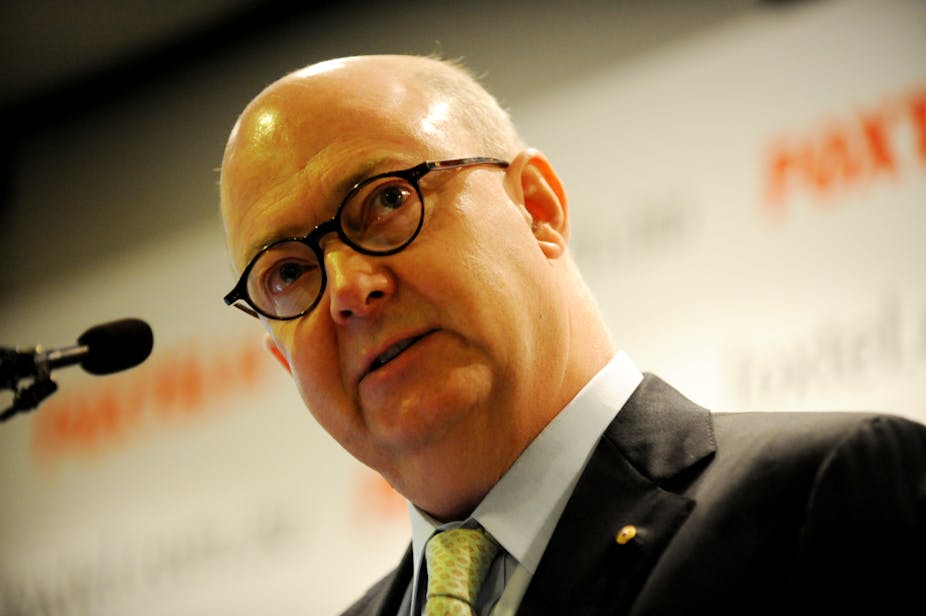A week is a long time in the media. Yesterday Kim Williams, the CEO of News Limited, announced a series of reforms to his company. This follows the slash-and-burn announcements by Fairfax Media earlier this week. While the same factors are driving change in both of these media companies, the approach could not be more different.
Fairfax seems to be facing the future with fear and loathing. It is shrinking. In contrast, News Limited is expanding. It is grasping new technology with both hands and bonding traditional and alternative news outlets together. Williams announced that News Limited wants to buy Consolidated Media, which includes 25% of Foxtel (giving News Limited a 50% share) and half of Fox Sports (giving News Limited 100% ownership, including significant sports broadcasting rights). News Limited is also buying the online publication Business Spectator and the associated Eureka Report.
Importantly, News Limited is rationalising its production of news. Put simply, the product will be “the news”, regardless of the specific medium that is used to communicate the product to the customers. Internet, television, and traditional newspaper content will have a centralised structure within News Limited.
What does this mean for the future of Australian news, sports and information? First, Williams seems to believe in the survival of paper-based news. Unlike the Fairfax announcement, which seemed to be a eulogy to paper-based news, Williams stated to ABC radio that the death of the newspaper has been exaggerated. “In 2020 I’m very confident that we’ll be producing very fine newspapers and they will be being consumed very actively across the length and breadth of Australia.”
It will be interesting to see if this prediction is wishful thinking or media spin. The purchase of the Business Spectator signals Williams’ belief the future of news delivery is via the Internet and will involve written, spoken, and video presentations. Paper-based newspapers can only do one of these.
Second, it appears that News Limited’s future is subscription-based news, sport and information. This is clearly the case for pay-TV. However, Alan Kohler, when speaking about his sale of the Business Spectator on the ABC, noted that a paywall would be rising around this currently-free business news outlet.
Despite Kohler’s optimism, using paywalls to make a profit out of internet news delivery is still in its infancy. Professor Joshua Gans, from the University of Toronto, recently made a case against paywalls.
“The newspaper owners of today suffer from the misconception that they are still a unique platform for communities because they are blinded by a "content is king” mentality. That is why they do not fear putting up paywalls — even metered ones.“
Third, News Limited’s announcement trumpets the death of any notion of separate and independent media channels for the delivery of news, sport and information. While convergence has long been a buzzword in the media industry, News Limited’s actions make it a fact.
News Limited’s acquisitions will create a challenge for the Australian Competition and Consumer Commission (ACCC). In 2006, the ACCC released a paper on media mergers outlining how it would deal with cross-media acquisitions.
As the ACCC noted: "Media outlets have traditionally been characterised by their modes of delivery. Thus, FTA television, pay-TV, radio and print media have generally been considered to be in separate markets” (paragraph 73). In contrast, convergence means that, for merger analysis: “[t]he product dimension of one market involves news, information and current affairs over a variety of modes of delivery including newspapers, radio, and online media …” (paragraph 159).
In other words, there is one news, information and current affairs product that can be delivered over a variety of modes. News Limited’s acquisitions, by consolidating modes, may reduce competition.
The News Limited acquisitions will be the first significant cross-media test for the ACCC. Since 2006 there have been a variety of acquisitions in the media, but they have often involved only one mode of delivery. The acquisition of Austar by Foxtel is the most recent example. It involved one pay-TV supplier acquiring another pay-TV supplier. In contrast the News Limited acquisitions are clearly cross media. Indeed, Kim Williams’ plan is all about cross-media consolidation.
The ACCC will probably look at three cross-media markets for News Limited’s acquisitions - the supply of advertising opportunities to advertisers; the supply of content to consumers; and the acquisition of content from content providers. News Limited’s acquisitions clearly cover two of these three – Fox Sport’s AFL and NRL rights and the provision of content via newspapers, Foxtel and Business Spectator. The ACCC’s views will have a significant influence on the future of news delivery in Australia.

